'I Don't Fit Neatly Into Any One Box,' By Janae Marie Kroczaleski
'I Don't Fit Neatly Into Any One Box,' By Janae Marie Kroczaleski
In 2015, Matt "Kroc" Kroczaleski was outed as transgender woman Janae Marie. She wrote this article on the ups and downs of her transition.
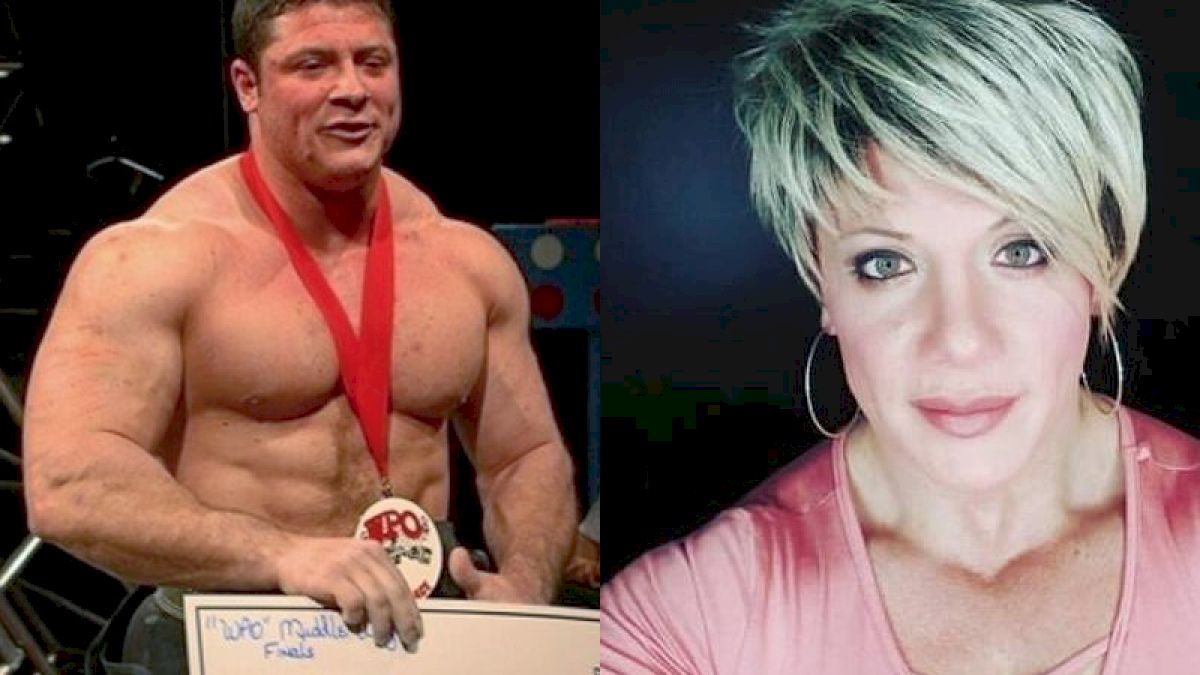
Unlock this article, live events, and more with a subscription!
Already a subscriber? Log In
Matt "Kroc" Kroczaleski's bona fides as a man were never in doubt. After graduating from high school, he joined the Marines, then went on to provide security for President Bill Clinton and his Secretary of State Warren Christopher. As a powerlifter, he won the World Powerlifting Organization World Championships at the Arnold Classic in 2006. Three years later, he set the all-time world record in the 220-pound weight class, squatting 1,003 pounds, deadlifting 810, and benching 738 for a three-lift total of 2,551. He invented the "Kroc row," a one-arm barbell row with ultra-heavy weight and as many as 20 repetitions. Transitioning almost seamlessly to bodybuilding, he was featured in numerous magazines and sponsored by the supplement company MuscleTech. But his hyper-masculine façade was just that, a façade. Identifying more as a woman than a man, Kroc attempted to transition in fits and starts over the course of the last decade, a process that was hastened on July 27, 2015, when a YouTube video outed him as the transgender woman Janae Marie Kroczaleski. Janae has since become an activist for transgender rights, is in the process of writing a book about her life, and is featured in the upcoming documentary Transformer, which will air this fall. The following is an update on the joys and difficulties of her transition, told in her words.
Like it or not, we have to use labels to describe ourselves. I identify as transgender, gender-fluid, and non-binary. If I was forced to pick a gender, I'd say that I identify as female more than male, but I don't fit neatly into any one box. I can be hyper-masculine and hyper-feminine. There's a degree of fluidity to my gender. It changes over time depending on circumstance: the day, the situation, the people I'm interacting with.
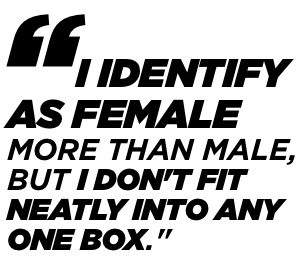
As soon as you label yourself a certain way, people are going to ascribe whatever they know about that label to you, and it may or may not fit. When I say I'm transgender, whoever I'm talking to is going to immediately assign everything they know about being transgender to me, whether or not it actually applies. If your only exposure to transgender people is something you saw on The Jerry Springer Show, then everything you know about transgender people is not only completely inaccurate in regard to me, it's also probably very negative.
My gender identity is very complicated and has created a lot of frustration and confusion for me. Over the course of the last ten years, I've started and stopped transitioning eight times, and it was always for the same reason. As I'd start to transition, I would make myself lose weight because society conditions us to believe that strength and muscles are for men and women aren't built that way. As independent as I try to be, I still fall prey to the same pressures most women do, trying to achieve this unrealistic feminine ideal.
Whenever I wanted to start losing weight, I would cut back on my lifting, but I would always get frustrated because I missed training hard and didn't want to be weaker. I thought, "How can I be a woman if I'm so passionate about strength training and wanting to be big and strong?" There was this constant back and forth. I went through periods where my femininity weighed on me so heavily and I felt this need to transition, then I'd start to do it and I'd get frustrated because I missed heavy lifting.
Before I was outed and fully committed to transitioning, I'd weighed more than 250 pounds for almost 20 years. At one point my weight climbed as high as 280, but I dropped all the way down to 200 about a year and a half ago in an effort to look more "feminine." I also didn't lift at all for about six weeks at one point--even though I hadn't taken more than a week or two off from lifting since I was 12 years old.
[instagram url="https://www.instagram.com/p/BPd8tdbjnp5/" hide_caption="0"]
To fill my competitive desires, I started training to do a triathlon, running, biking, and swimming. I enjoy all sports, but what I love more than anything is strength training, and I realized I would never be happy without having that in my life. Trying to walk away from it made me realize how much I loved it.
There were some things I enjoyed about being (relatively) small. It was much easier to find clothes that fit me, and I was more comfortable wearing certain outfits than I'd been before. But at the same time losing so much of the strength and size I'd worked so hard to attain frustrated me.
I also started to feel vulnerable. It reminded me of how I felt during my childhood when I was small and skinny. I only weighed 100 pounds in seventh grade and 118 during my freshman year of high school. I got bullied by older, bigger kids a couple of times, and I remember being terrified. I forgot all about that feeling until I started losing weight and getting smaller during my transition. I hated that feeling.
When I'd start to feel that way, I'd think, "You know what? Maybe I'm not trans. Maybe transition isn't the right move." Then I'd go back to doing the guy thing 100 percent. It was this constant back and forth for a decade.
The Lightbulb Moment
A huge turning point for me came when I started getting closer to some of the top female power lifters. After coming out, I became really good friends with a lot of them, and I saw that they also struggled with trying to balance their passion for strength training with their femininity. In our society, there's a lot of pressure on women to not be thick and muscular. They're told, "You look like a man." Discovering that these women struggled with the same thing I did was a lightbulb moment for me. I realized that it wasn't just me who felt this way and that I couldn't simply blame it on being trans.
[instagram url="https://www.instagram.com/p/BQiYY6rjrHY/" hide_caption="0"]
Last April, I decided to just do what makes me happy and what feels right. I went back to training the way I'd always trained. I hit the weights really hard and, after dieting for almost nine months, allowed myself to start eating more again. My weight shot up to 240 right away and got as high as 254 in October. Because I'd gained a little body fat, I scaled back my diet, cutting some calories, but I didn't scale back my training.
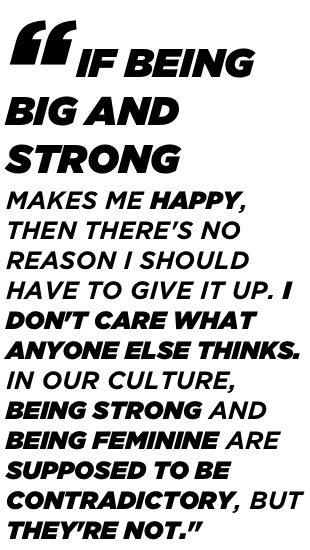
Now my body weight fluctuates between 230 and 240. I wouldn't mind being a little leaner, but I'm not dieting like I would pre-contest. Having to follow a diet that you can only do for a short period of time would make me miserable. My goals at the gym are still to get stronger and be in the best possible shape I can be in. I want to maintain the muscle and strength I have right now.
If being big and strong makes me happy, then there's no reason I should have to give it up. I don't care what anyone else thinks. In our culture, being strong and being feminine are supposed to be contradictory, but they're not. That's just something we've been conditioned to believe. The idea that strength and muscularity is only for men is not only outdated but completely absurd. Fortunately, our society's attitude about what women are supposed to be and what men are supposed to be is beginning to shift. We're moving in the right direction, but we still have a long way to go.
I'm happy with where I'm at now. I'm okay with being someone who stands out in public. I know people are going to stare and that doesn't bother me. I realize I'm not a common sight. I'm secure enough about who I am that I really don't care what other people think. If someone has a problem with my transition, that's their problem, not mine. I'm comfortable in my own skin, and that's what matters most.
I'm sure I confuse some people. I had vocal feminization surgery in January and my voice has gotten higher. I had facial surgery in late April. And I went to work every single day from October until just a few weeks ago presenting as female. But then I showed up at work a few weeks ago in "boy mode"--my nails were painted and I carried a purse, but I was wearing jeans and a T-shirt and had no makeup on--and my coworkers looked like they'd seen a ghost. They had almost forgotten what I look like when I'm not presenting as female.
Like I said, I don't fit neatly into one box. There's a fluidity to my gender. Whereas before I thought, "If I'm a woman, I have to do this and if I'm a guy, I have to do that, otherwise I won't fit in," now I really don't care because I realize I would never find peace trying to conform to these gender roles. If I feel like being a little more masculine one day, I'm more masculine, and if I feel like being more feminine the next, I'm more feminine.
I'm still decently strong in the gym, but now I'm more focused on being a well-rounded athlete than the strongest person in the world. Your training has to be really focused if you're striving to be number one in the world. You've got to be willing to sacrifice everything. If I got injured during a competition, I didn't care. One year I experienced a partial tear of my triceps a week before the Arnold, and I went and lifted anyway. I didn't care if I tore it all the way off. I just hoped I'd get enough lifts in to win before it occurred.
The Hormonal Advantage
The lifting community's response to my transition has been incredible. I get tons of messages from people who tell me, "Thank you so much for being open and honest about who you are." As it turns out, there are a lot of male lifters who feel this pull toward a female gender identity. It's far more common than anyone suspects, but, just as I was, these people are terrified to be their true selves and to share with their family and friends how they really feel.
A lot of female lifters have encouraged me to lift at their competitions as a "guest lifter." (I wouldn't be competing against anyone, and I wouldn't be eligible to break any records.) They've told me they would be honored to compete with me and have welcomed me with open arms, which I really appreciate. I was afraid it would be the opposite, that they wouldn't accept me and would feel resentment.
I miss competing, but for now that's not something I'm interested in doing because I feel like it would have a negative effect on transgender athletes and powerlifting. If I competed, there would be huge backlash. Anytime the idea of a male-to-female transgender athlete competing with women comes up, everybody freaks out. People say that it's unfair, that it's a man competing against women, and that they're going to break all the records, even though that's never actually happened. Male-to-female transgender athletes have competed against women in NCAA events and the Olympics, but none of them have done all that well.
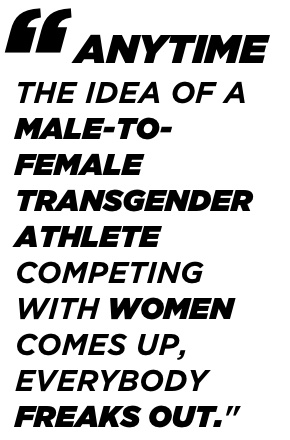 To my knowledge, no trans woman has ever broken a world record or even medaled at the Olympics, although Laurel Hubbard, a weightlifter from New Zealand, may change that. She recently won the Australian International weightlifting competition, set a new national record for the women's clean and jerk, and hopes to compete at the 2020 Summer Olympics. If she succeeds in breaking a world record and especially if she wins Olympic gold, I fear that the resulting backlash against transgender athletes will be severe. Trans athletes have been allowed to compete in weightlifting for many years and many have done so, but you've never heard about them because they weren't successful. Now that a transgender woman is having some success in weightlifting we're already seeing a slew of articles about how unfair it is for her to be allowed to compete.
To my knowledge, no trans woman has ever broken a world record or even medaled at the Olympics, although Laurel Hubbard, a weightlifter from New Zealand, may change that. She recently won the Australian International weightlifting competition, set a new national record for the women's clean and jerk, and hopes to compete at the 2020 Summer Olympics. If she succeeds in breaking a world record and especially if she wins Olympic gold, I fear that the resulting backlash against transgender athletes will be severe. Trans athletes have been allowed to compete in weightlifting for many years and many have done so, but you've never heard about them because they weren't successful. Now that a transgender woman is having some success in weightlifting we're already seeing a slew of articles about how unfair it is for her to be allowed to compete.
The primary athletic advantage that males enjoy over females can be traced to hormonal differences; i.e., having more testosterone and less estrogen. Hormones make a bigger difference in athletic performance than any other single factor. But once you remove that advantage, once you take away the testosterone and add estrogen in the same levels that a genetic woman would produce, any advantage that a male-to-female transgender athlete initially had will disappear over time.
I experienced this firsthand. When I got testicular cancer in 2004, the doctors removed one of my testicles. In November 2015, I had the other one removed, this time voluntarily, so, other than the minuscule amount my adrenal glands generate, my body no longer produces testosterone. I also started taking estrogen in July 2015, and as soon as I did my strength plummeted. My lifts went down 20, 30, even 40 pounds in a week. I would go in one week and put on the weight I'd used just a week prior, and I wouldn't be able to lift it. It finally leveled off, but the difference between what I could lift before and after I started taking estrogen was dramatic.
It's fairly typical for transgender athletes to experience this sort of drop-off. I once read a story in a runner's magazine about an elite runner who transitioned from male to female. She thought, "I'm going to dominate the female runners. My times as a male were really fast, so now they should be among the very best." That didn't happen. Instead, her times dropped off proportionately. If she'd been in the top 10 percent of all male runners, she ended up being in the top 10 percent of all female runners, but she wasn't breaking world records.
Since I've been on estrogen, my strength has decreased dramatically from where it was before but only proportionately between the genders. After being one of the strongest men in the world, my strength is now on par with the some of the best heavyweight female lifters in the world. I don't have any plans to compete against them, but if I did, I would be on the same level as them.
[instagram url="https://www.instagram.com/p/BTmjDbJltw6/" hide_caption="0"]
I recently met a woman who was in favor of doing away with gendered sports altogether. She felt that most women don't perform on the same level as men because they've been conditioned to believe that they can't, that the disparity between men and women in sports is as much psychological as it is physiological. Anytime you set the bar lower for certain people, you encourage them to lower their expectations, but I don't agree with her 100 percent. While there is some truth in what she believes, it's unrealistic to completely discount the effect that hormones have on our bodies.
We're seeing the gap between men's performances and women's performances close a bit. If you look at the women's records over the last 50 years, they've progressed a lot more than the men's have. But the gaps are still huge. In many sports, the top male high school athletes in the world are often on par with the top female athletes in the world. There are some social factors that help explain the gap, such as the fact that women haven't been as active in sports for as long as men and the fact that more men compete in sports than women, but I don't think the advantage provided by testosterone will ever be overcome. As much as I wish it were a completely level playing field, it simply isn't.
Normal Is An Illusion
I do think we're moving toward a place where it's more acceptable for people of both genders to live any way they see fit. In our society, women can pretty much wear any type of clothing they want. They can cut their hair short. They don't have to wear makeup. They have a lot more freedom to be who they are without it being shocking or taboo. We're seeing that more with men, too. Guys are growing their hair out and wearing skinny jeans and tights. A couple years ago, you couldn't find tights that were specifically designed for men. Now all the major athletic retailers carry them.
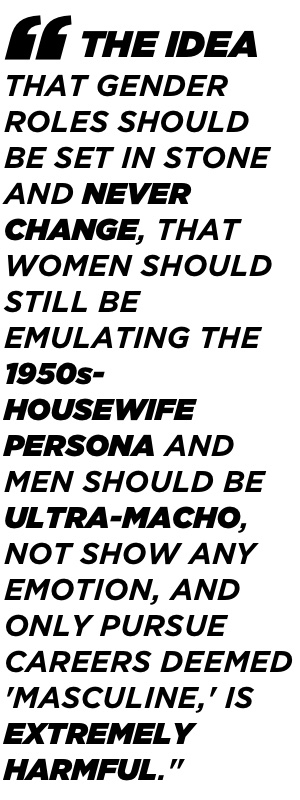
It's important to recognize that gender roles are almost entirely arbitrary. They're determined by society, and they change over time. In the 1930s, women weren't allowed to wear pants in public. I remember my grandma telling me that, when she was younger, women wouldn't be allowed to enter a store if they were wearing pants.
Not only do gender roles change over time but from culture to culture. For example, Iceland is very progressive when it comes to gender and sexuality, while Saudi Arabia is on the opposite end of the spectrum. What is acceptable for a woman in Iceland to do could get her thrown in prison in Saudi Arabia.
The idea that gender roles should be set in stone and never change, that women should still be emulating the 1950s-housewife persona and men should be ultra-macho, not show any emotion, and only pursue careers deemed "masculine," is extremely harmful. Anyone who doesn't naturally fit into these categories will be frustrated as they try to live up to ideals they're never going to be comfortable attaining. Anytime you force yourself to be someone you aren't, you're never going to be happy.
We're all different in our own ways. We all have characteristics we don't feel confident about or we're afraid to reveal. And we're all struggling to feel comfortable with who we are, even if we don't have any issues with our gender or our sexuality. Unfortunately, we're stuck on this idea of being normal. But normal is only that side of ourselves we're comfortable sharing because we think it will be accepted by the people around us. To me, normal is an illusion.